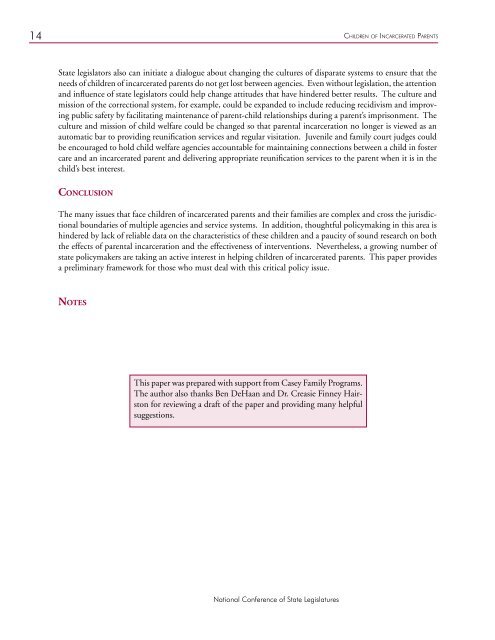Children of Incarcerated Parents
Children of Incarcerated Parents
Children of Incarcerated Parents
You also want an ePaper? Increase the reach of your titles
YUMPU automatically turns print PDFs into web optimized ePapers that Google loves.
14 Ch i l d r e n o f In c a r c e r at e d Pa r e n t s<br />
State legislators also can initiate a dialogue about changing the cultures <strong>of</strong> disparate systems to ensure that the<br />
needs <strong>of</strong> children <strong>of</strong> incarcerated parents do not get lost between agencies. Even without legislation, the attention<br />
and influence <strong>of</strong> state legislators could help change attitudes that have hindered better results. The culture and<br />
mission <strong>of</strong> the correctional system, for example, could be expanded to include reducing recidivism and improving<br />
public safety by facilitating maintenance <strong>of</strong> parent-child relationships during a parent’s imprisonment. The<br />
culture and mission <strong>of</strong> child welfare could be changed so that parental incarceration no longer is viewed as an<br />
automatic bar to providing reunification services and regular visitation. Juvenile and family court judges could<br />
be encouraged to hold child welfare agencies accountable for maintaining connections between a child in foster<br />
care and an incarcerated parent and delivering appropriate reunification services to the parent when it is in the<br />
child’s best interest.<br />
Co n c l u s i o n<br />
The many issues that face children <strong>of</strong> incarcerated parents and their families are complex and cross the jurisdictional<br />
boundaries <strong>of</strong> multiple agencies and service systems. In addition, thoughtful policymaking in this area is<br />
hindered by lack <strong>of</strong> reliable data on the characteristics <strong>of</strong> these children and a paucity <strong>of</strong> sound research on both<br />
the effects <strong>of</strong> parental incarceration and the effectiveness <strong>of</strong> interventions. Nevertheless, a growing number <strong>of</strong><br />
state policymakers are taking an active interest in helping children <strong>of</strong> incarcerated parents. This paper provides<br />
a preliminary framework for those who must deal with this critical policy issue.<br />
No t e s<br />
This paper was prepared with support from Casey Family Programs.<br />
The author also thanks Ben DeHaan and Dr. Creasie Finney Hairston<br />
for reviewing a draft <strong>of</strong> the paper and providing many helpful<br />
suggestions.<br />
National Conference <strong>of</strong> State Legislatures

















